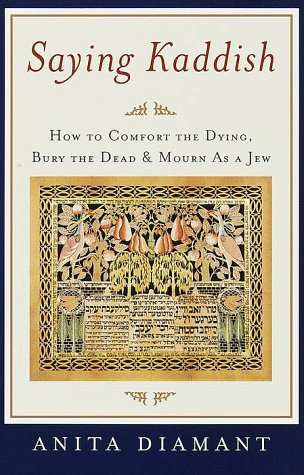
Anita Diamant’s knowledge, sensitivity, and clarity have made her one of the most respected writers of guides to Jewish life. In Saying Kaddish, she shows how to make Judaism’s time-honored rituals into personal, meaningful sources of comfort. Diamant guides the reader through Jewish practices that attend the end of life, from the sickroom to the funeral to the week, month, and year that follow. There are chapters describing the traditional Jewish funeral and the customs of Shiva, the first week after death when mourners are comforted and cared for by community, friends, and family. She also explains the protected status of Jewish mourners, who are exempt from responsibilities of social, business, and religious life during Shloshim, the first thirty days. And she provides detailed instructions for the rituals of Yizkor and Yahrzeit, as well as chapters about caring for grieving children, mourning the death of a child, neonatal loss, suicide, and the death of non-Jewish loved ones.”In the past, when a Jew died, no one asked, ‘When should we schedule the funeral?’ or ‘How much would you like to spend on the casket?’ or ‘Where will she be buried?'”
The law and the synagogue had ready answers to all of these questions, as Anita Diamant notes in Saying Kaddish. Yet today, Jews must grapple with dozens of questions that make the process of grief difficult to understand in religious terms–questions such as, “How can I, as a Jew-by-choice, mourn for my Catholic father or my Baptist sister?” Diamant’s book guides readers to make responsible decisions about how to honor the dead with integrity. Her practical advice is complemented by personal reflections and historical explanations, in a book that will help readers find their way, and make them feel less alone, in the excruciatingly lonely process of grief. –Michael Joseph Gross

Easy to read and helpful during a tough time. Anita is an excellent writer and relates Jewish custom in an understanding way, always acknowledging that different types of Jews chose to celebrate/mourn differently. She is never condescending and does not Judge. This is extremely informative and I would highly recommend it to anyone. I personally have been comforted by the book as it has explained my role during the death of a loved one.
spiritual guidance This is a wonderful book. It provides full information on Jewish death and mourning laws and customs, but also talks more about the spiritual connotations of these practices. It is a wonderful companion to Lamm’s more detailed book. Unlike Lamm, she talks about the full gamut of observances from orthodox to reform for each stage of the mourning process. She provides not only liturgy but meaningful poems and discusses how people have used some of these readings for personal rituals.Her writing is excellent and you feel like she is a loving friend guiding you through the difficult emotions of death and mourning. She anticipated many of the emotions and stages I encountered in my recent mourning. It is not depressing but hopeful, bringing you connection to the community of other Jews who have had losses.Actually, even if you are not Jewish I think it could be a helpful guide to the stages of dying and mourning and help anyone work through the death of a…
Comfort for Jews of all types This is a wonderful book written from a generally liberal point of view. It explains the traditions surrounding Jewish death and mourning and gently encourages the reader to follow them, without being judgmental of those who choose other paths. As I await my mother’s death, I am learning many things about my faith… and as the author points out, expanding one’s knowledge of Judaism is a mitzvah for the mourner.